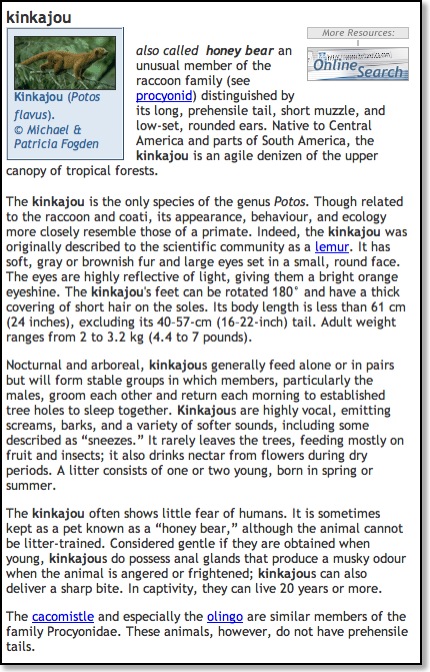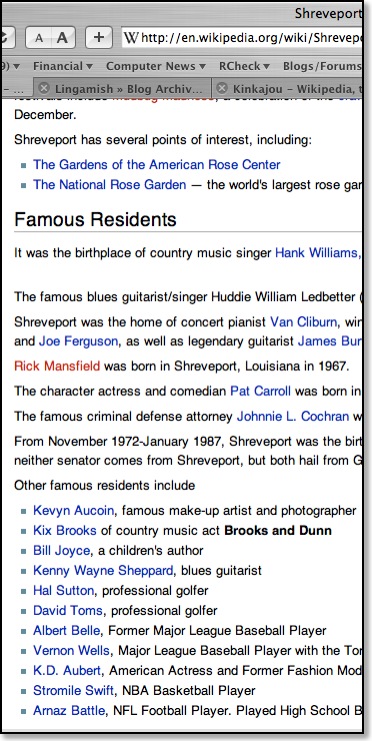Is the Wikipedia the Hitchhiker's Guide to the Galaxy?
From The Hitchhiker's Guide to the Galaxy (that is, the book by Douglas Adams), ch. 2:
Here's what the Encyclopedia Galactica has to say about alcohol. It says that alcohol is a colorless volatile liquid formed by the fermentation of sugars and also notes its intoxicating effect on certain carbon-based life forms.
The Hitchhiker's Guide to the Galaxy also mentions alcohol. It says that the best drink in existence is the Pan Galactic Gargle Blaster.
It says that the effect of drinking a Pan Galactic Gargle Blaster is like having your brains smashed out by a slice of lemon wrapped round a large gold brick.
The Guide also tells you on which planets the best Pan Galactic Gargle Blasters are mixed, how much you can expect to pay for one and what voluntary organizations exist to help you rehabilitate afterward.
The Guide even tells you how you can mix one yourself.
Take the juice from one bottle of the Ol' Janx Spirit, it says.
Pour into it one measure of water from the seas of Santraginus V--Oh, that Santraginean seawater, it says. Oh, those Santraginean fish!
Allow three cubes of Arcturan Mega-gin to melt into the mixture (it must be properly iced or the benzine is lost).
Allow four liters of Fallian marsh gas to bubble through it, in memory of all those happy bikers who have died of pleasure in the Marshes of Fallia.
Over the back of a silver spoon, float a measure of Qualactin Hypermint extract, redolent of all the beady odors of the dark Qualactin Zones, subtle, sweet and mystic.
Drop in the tooth of an Algolian Suntiger. Watch it disolve, spreading the fires of the Algolian Suns deep into the heart of the drink.
Sprinkle Zamphuor.
Add an olive.
Drink...but...very carefully...
The Hitchhiker's Guide to the Galaxy sells rather better than the Encyclopedia Galactica.
Now hold that thought.
For those of you just tuning in, this post is part of an ongoing conversation between myself and David Ker (host of Lingamish) regarding the benefits and limitations of encyclopedias such as the Wikipedia and Encyclopedia Britannica. David is bonkers over the Wikipedia. I'm much more trusting of the kind of editorial controls found in a more traditional source like Britannica.
Having said that, I use the Wikipedia regularly. I have multiple links to it here on my blog. Encyclopedias are the starting point of research, and as such, both the Wikipedia and Britannica are good sources of information. But in the end, for serious starting points, I simply favor Britannica and its editorial controls.
In David's last post, "The Flattening of Knowledge," he spoke of the benefits of collaboration on the internet. He noted that more people have access to information than at any other time in the history of the world, and more people have an opportunity to be heard than ever before. Both of these ideas are very true, and the Wikipedia embodies them both.
I'm not opposed to access to information by everyone; nor am I opposed to voices being heard. But as I have mentioned before, I have problems with the Wikipedia's absence of--for lack of a better term--quality control. I have already discussed my concern, not with the democratization of knowledge, but the democratization of truth. The advantage of the Wikipedia is also its curse: anyone can contribute. And regardless of whether or not information is true, it can remain in an article unless it's challenged. But even if it's challenged, if the original contributor is persistent enough or if enough other contributors agree (or can be convinced to agree), then the posting becomes fact. This is a problem, no matter how much we revel in all of our voices being heard. And in my opinion, that makes the Wikipedia an unreliable source because information becomes far too fluid.
A second concern of mine has to do with the Wikipedia's lack of editorial discretion. What I mean by this is that there's really no control over what information is included, even insignificant details about a subject or even insignificant subjects themselves.
For instance, the Wikipedia boasts 1,300,000 articles in English. Now the online version of Encyclopedia Britannica only has about 100,000 articles. Does the Wikipedia therefore trump Britannica? I don't think so. On any Wikipedia page, there's a link in the top left side called "Random Article." Here are five clicks I made. I give you my word that these are the articles I received in five successive hits and I haven't fudged the list in any way.
1. British School - Muscat = "a school in Muscat, Oman, catering primarily for the British expatriate community, but containing many students of many different nationalities."
2. Asherah = (from Hebrew אשרה), generally taken as identical with the Ugaritic goddess Athirat (more pedantically but accurately ʼAṯirat), was a major northwest Semitic mother goddess, appearing occasionally also in Akkadian sources as Ashratum/Ashratu and in Hittite as Asherdu(s) or Ashertu(s) or Aserdu(s) or Asertu(s)."
3. Pedro Dimas = "a Mexican violinist, guitarist, composer, and preservationist of traditional music from the Purépecha, an indigenous culture in the Mexican state of Michoacán."
4. Sumed Ibrahem = "(born December 30, 1980 in Tamale, Ghana) is a Ghanaian soccer player, who, as of 2005, plays midfield for the Harrisburg City Islanders of USL Second Division."
5. Abaújvár = "a village in Hungary, next to the Slovakian border. It lies 72 km northeast of Miskolc."
Of these entries, only the second one is also included in the Encyclopedia Britannica. Does this make Britannica inferior? I don't think so. I guess it's good to have all this other information in one handy place, but I think it demonstrates that the sheer number of articles in Wikipedia doesn't mean much as some are so obscure they are essentially irrelevant for the average person. There are articles for everything form comic book characters to individual episodes of television shows. Thus, the Wikipedia is a bit like the Hitchhiker's Guide to the Galaxy as it contains information on just about everything. I suppose that this is not a bad thing, but it does not make it superior to Britannica which by necessity should be more selective in its content.
Another problem with this lack of editorial discretion is the kind of information found in many of the articles. Let me illustrate. Last week, Kathy and I were at home watching the news on one of the cable channels, and after the serious events of the day were exhausted, a report was aired about Paris Hilton having to go to the emergency room in the middle of the night because she was bit by her pet kinkajou. I had never heard of a kinkajou and announced as much to Kathy.
"You've never heard of a kinkajou?" she asked as if surprised.
"No," I replied. "What's a kinkajou."
"Everyone knows what a kinkajou is. It's an exotic pet. Paris Hilton has one."
Not impressed with her explanation, I decided to look kinkajou up for myself in my 2006 edition of Britannica that I have loaded on my PowerBook. I got this short article:

Well, not too bad. It gave me everything I need to know and then some. In preparation for this blog entry, I decided to look up kinkajou in the Wikipedia. To its credit, I got pretty much the same information--at least in regard to the main facts. But I nearly fell out of my chair when I noticed this sentence: "Paris Hilton's Kinkajou, "Baby Luv" has been in the media twice in the past two years; once when he scratched her and the CA Fish and Game Dept issued her a warning for illegally transporting the animal, and again in August 2006 when he bit her arm. Both injuries were minor. Owning a kinkajou in CA is illegal." Is this really important information to put an article about this animal? Will this be relevant in 50 years? In 50 days? [Note: it seems that evidently, there is a Wiki-squabble going on and various forms of the Paris Hilton incident have been added and removed over the last few days. If you decide to look up the kinkajou article and you think I made the whole Paris Hilton insertion up, please look at the history of the article. All I know is that I expect Google hits to my website to triple now that I've used the name "Paris Hilton" five times in one blog entry.] Regardless, this is a prime example of the lack of a final editorial control over the Wikipedia's content. Certainly, someone may remove objectionable content, but there's nothing to keep someone else from putting it back in. Such self-regulation appears very democratic on the surface, but it seems to me that there needs to be a final authority who can simply freeze content.
As an experiment of how easy it is to manipulate an article, I added a reference to myself in one. Now, I didn't add fraudulent information, but I did add irrelevant information. Under the famous residents section of the Wikipedia article on Shreveport, Louisiana, I listed myself as having been born there (which I was). I'm going to paste it here below because I don't think it's ethical for me to leave it there more than about 24 hours just to prove my point.

My name is in red because I created a stub for my name so that it could be edited, and thus a new article about yours truly could be created. Don't worry, as I said, I'm going to remove the whole thing. This is just to prove why I believe a peer-edited resource like Britannica is a much more reliable source of information than the Wikipedia.
David, I will concede to you a major point. You wrote in your last post about this subject:
We can talk all we want about how wonderful the editors and writers are for EB but the simple fact is this:
Virtually no one has access to the Encyclopedia Britannica in the 21st century!
So if you consider that to be a problem (I do!), then our primary concern should be creating access to the EB. If the publishers don’t fix that problem, their excellent information is going to become rapidly irrelevant.
Frankly, I can only assume that the rise of the personal computer and especially the internet has hurt Britannica sales dramatically. If video killed the radio star, will the internet kill the bound encyclopedia? Maybe. Britannica is available in three forms: (1) the print bound set, (2) computer editions, and (3) all articles are available via the internet. But unlike the Wikipedia, none of these are free unless you count access to the bound sets at your local library. The fee-based internet editions are primarily sold to schools. The online edition is updated daily, but not by just anyone, and inclusions of pop-culture figures and events are weighed very carefully. But if the PTB at Britannica decided to simply give this information away for free to everyone over the internet, how would they stay in business? This is something I don't have an easy answer for.
Fortunately the Hitchhiker's Guide to the Galaxy says, DON'T PANIC.









